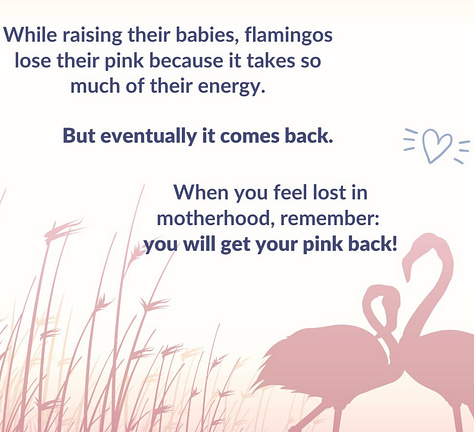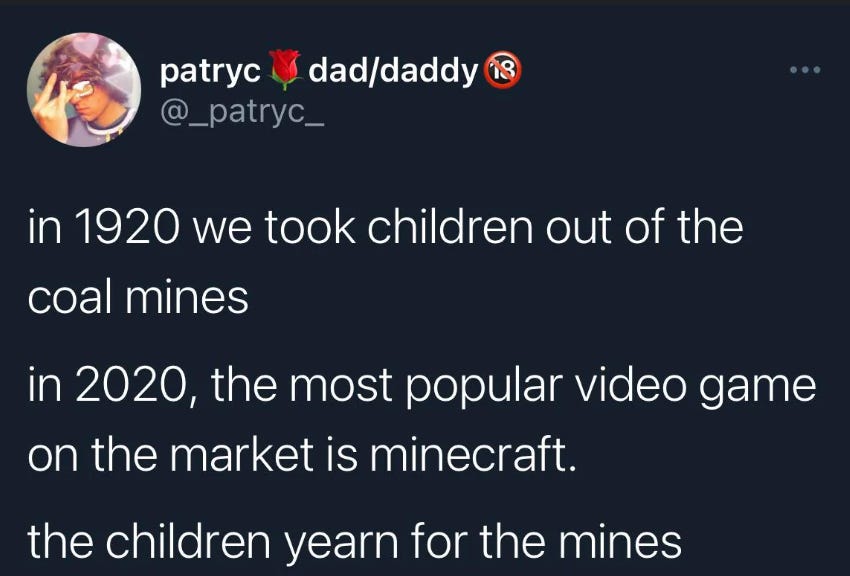On Nightbitches and Gray Flamingos
Modern depictions of motherhood, online and offline, are stuck in a dead conversation.
This newsletter is run by two moms who have committed their little free time to building a community of fellow radical lunatics who want to change the culture whilst enjoying decent memes. If this is a mission that moves you we encourage you to upgrade your subscription to paid.
There’s a preview for the new Minecraft movie, where, in voice-over, an adult Jack Black says that as a child he, “yearned for the mines.”
Those of us who are chronically online caught the (stolen) joke immediately.
The often-screenshotted and viral line originated on Twitter. Hollywood movie studios will suck up memes, tweets, and Reddit comments into their content machines and repurpose them into things like a Minecraft trailer as a way to:
Signal that they are just as relevant as the newest TikTok dance.
Cynically rework what’s already been crowd-sourced as funny and palatable.
And so we have the same dynamic in Nightbitch. It borrows all the familiar tropes from social media’s take on motherhood:
Motherhood is boring, thankless, and monotonous.
Men are clueless and infuriating (sometimes true).
Moms who enjoy motherhood and the tasks surrounding it are unambitious, trite, and often airheads.
And the movie centers itself on the most overused trope of all: losing yourself to motherhood. This sentiment is also captured in the viral meme about mother flamingos losing their pink while they raise little baby flamingos because mothering needy chicks literally drains them of vitality and nutrients (they get their pink color from brine shrimp). Which, at first, seems like a tidy little metaphor for the momentous challenges of raising young children. In some ways, it’s a more polite version of the openly lamenting being consumed by motherhood. In other ways, it’s an easy way to refute that motherhood can be the highest calling for women who embrace the immense sacrifices and soaring highs of people making.






For the last 60 years, the conversation around motherhood has been stuck in the same Voldemort vs. Harry zero-sum game: pursuing your dreams or having a sense of self outside of being a mother—"neither can live while the other survives."
Nightbitch keeps us stuck in this dead conversation.
In one scene, the protagonist (known only as "Mother"—her children are also nameless. Is she no one? Anyone? ALL OF US? None of this is explored) runs into a friend at the grocery store who asks how she likes motherhood. Mother admits, “I’m deeply afraid that I’ll never be smart, or happy, or thin ever again.” But it turns out that was just a quick fantasy. Instead, she answers, “I love being a mom.”
Nightbitch poses a potentially fascinating conceit: What if a stay-at-home mom, crushed by the unrelenting demands of caring for two small children, became so alienated from her sense of self that she came to believe she turned into a dog at night? Not a pampered chiweenie lapdog, but a feral, four-legged beast, romping around with a gang of other canines.
Being the mother of young children means being steeped in our most primal selves. Our days are ruled by milk, sweat, tears, piss, and shit. The raw urgency of hunger, thirst, and discomfort bursts out of our children, and we are hardwired to respond, let down, and quell our brood. In Nightbitch, Amy Adams (six-time Oscar nominee—so yes, she does a good job with flimsy material) plays a fine arts painter, the height of civilized culture, who finds herself transformed into the most uncivilized version of herself. Her suppressed self ERUPTS.
Could be cool??!
Except the movie does nothing with this premise, beyond giving Mother extra nipples, a craving for raw meat, and an intense dislike of the family cat. Metaphor? Magical realism? The filmmakers don’t seem to give a shit! The whole thing plays out like an abandoned SNL sketch that was cut for time—one ‘joke’ stretched over 90 minutes.
Judging from the glowing reviews of the source material, a buzzy novel by Rachel Yoder, Nightbitch’s narrative power came from its exploration of a mother’s psyche as it melts and reorients to the primitive world of child-rearing.
In the novel, Yoder describes motherhood as “one of the most potent forces in human society, which of course men have been hasty to quash, for they are right to fear these forces.”
The closest the movie gets to conveying this sentiment is during a library storytime scene, where the moms gather to discuss the shock and awe of motherhood. In a line that feels totally out of place among the gnarly birth trauma imagery the women are sharing, Mother says, “Do you ever think the big secret is that we’re Gods? We create life. We make life. We are so powerful.”
The jarring line gets blank stares and a quick cutaway—almost as if it's meant as comedic relief.
Nightbitch had a kooky enough premise to give us a surrealist exploration of how motherhood drives women into their most wild and primal selves—something that should be celebrated and revered rather than feared. Instead, the movie focused on the idea that motherhood drives women to insanity, played for laughs. Like, "haha, motherhood is so hard we’re all going crazy! Hashtag momlife!"
The best parts of the movie were when Mother lost herself in the chaotic, uncontrollable nature of day-to-day life with a toddler—and enjoyed it. There’s a scene where she and her toddler cover themselves in paint and roll around on the kitchen floor, and for a moment, my heart lifted. But those moments were fleeting and bittersweet. Whenever Mother loses herself, something bad inevitably happens. The toddler runs away covered in paint and smears it all over the walls. Or they pretend to be dogs at the grocery store, and onlookers are weirded out. Moms can’t ever just enjoy their kids without something negative being thrown at them.
Watching Nightbitch brings up the same feelings I get scrolling through the #hotmessmotherhood hashtag—mostly women agonizing over the endless inconveniences toddlers bring. Some do it comedically; many more do it tearfully. While I appreciate that it’s now normal to speak openly about the hard parts of motherhood, the conversation never seems to evolve past victimhood.
Motherhood is transformation. It is loss. Old parts of you wither away while another chamber of your heart opens.
Of course, of course, there are nights when my son refuses to sleep unless I’m next to him, and with every passing minute, I feel my tiny sliver of nocturnal free time slipping away. But I also know that not too long from now, my son won’t want me next to him at all. So I try to relax, breathe in the intoxicating scent of his hair—just like I did when he was a newborn—and let myself drift alongside him.
This newsletter is run by two moms who have committed their little free time to building a community of fellow radical lunatics who want to change the culture whilst enjoying decent memes. If this is a mission that moves you we encourage you to upgrade your subscription to paid.












Love this unpopular opinion!!!
This was interesting Andrea! Love a good lit analysis ;) I haven’t seen the movie but I loved the novel… I’ve been wanting to write about it!